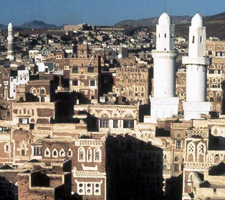
Yemen.
Yemen is an ancient and beautiful country – but today it is fraught with danger. Though barely a blip on the world’s radar screen, Yemen poses serious potential risks to the great oil producers of the Gulf region, and thus to the world economy at large.
Yemen, the southwest corner and geographical anchor of the Arabian Peninsula, has been torn by strife for years. But unlike Syria, where today’s media attention is focused, Yemen is so remote and so little known to the outside world that its wars and crises are rarely noticed by Western (particularly American) news media and seldom highlighted by foreign affairs gurus. Apart from the al-Qaeda suicide attack on the USS Cole in Yemen’s Aden harbor in the year 2000, few Americans have heard anything substantive about that country from their favorite television news channels, and major newspapers tend to consign its travails to the inside pages.
The difference is that Syria has long been a major player in the Middle East, and its fate is of great interest to many, but so few people know anything about Yemen that it is hard to generate concern for its future.
Yemen? Isn’t that what the Romans called Arabia Felix – Fortunate (and Fertile) Arabia? Wasn’t it the land of the Queen of Sheba?

Old Sana’a is considered by many historians to be one of the oldest, continuously-inhabited cities in the world. Declared a World Heritage City by UNESCO in 1984, Sana’a’s historic section has 103 mosques, 14 hammams (public bath houses), and over 6,000 traditional residences in which Yemenis still live with their families. Photo: Yemen College for Middle Eastern Studies.
Yes, it was those things, but that is about the extent of most Americans’ knowledge of the country. In addition to being an important leg of age-old land and maritime trade routes, Yemen was a formidable ancient sea power at the time of the Phoenicians, and later a medieval center of scholarship and learning. In modern times – up until recent years when the fighting got bad – Yemen was a popular tourist destination for Westerners living and working in the Middle East. Yemen drew tourists looking for a taste of the old Middle East, with its colorful traditional markets, stunning medieval architecture and exotic tribal lifestyles.
For years now, though, this kind of tourism has proven risky. The north of Yemen has been wracked by a revolt of Zaidi Shi’ites called “Houthis” after their late rebel clan leader Hussein Badreddin al-Houthi, killed by government forces in 2004. (His brothers continued the insurgency.) Zaidis, whose faith is an offshoot of mainstream Shi’a belief, make up a sizable chunk of the population in the north. The Houthis agreed to a ceasefire in 2010, but unrest continues.
Continue reading »





You must be logged in to post a comment.